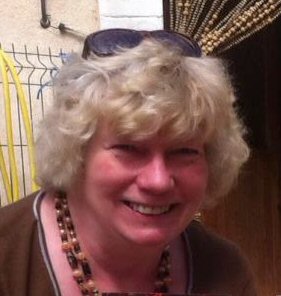I’m delighted to welcome Sue Barnard to Inheritance Books.
Hi Sue, welcome. Would you like a cuppa? Piece of fruit (pre-Christmas health kick, don’t you know)? Please, tell us a bit about yourself.
I was born in North Wales but have lived for most of my life in or around Manchester, apart from the three years which I spent studying French at Durham University. I’m married with two grown-up sons.
I’ve dabbled with writing, off and on, for many years, but it’s only during the past ten years or so, following a life-changing event in my own circumstances, that I’ve begun to take the craft more seriously. During that time I’ve taken several courses in various forms of Creative Writing, both with the Open University and elsewhere.
I’m a member of the editorial team of Crooked Cat Publishing, who have also published two of my novels (The Ghostly Father and Nice Girls Don’t) and have recently accepted a third, which is due to be published in 2015.
I’m very interested in Family History, and this has provided the basis for the storyline of my second novel Nice Girls Don’t. My own family history is stranger than fiction, and would probably fill an entire (if somewhat incredible) book on its own.
I now live in Cheshire, with my extremely patient husband and a large collection of unfinished scribblings.
Wow, sounds like you’ve been very busy! So, which book have you inherited from generations above? Why is it special?
As a child I loved reading, and I was a regular visitor to my local and school libraries, but believe it or not my childhood home contained very few books, apart from those which I was given as gifts or which I bought myself with my pocket-money. It never occurred to me to wonder why, and now I don’t suppose I’ll ever find out.
The only book I have from my parents’ generation is a small, tatty, 48-page cookbook, published by the makers of Kingpin Flour. There’s no date on it, but I think it was produced in the 1950s. It originally cost two shillings – the equivalent of a princely 10p in today’s money, but at the time, in real terms, probably significantly more.
The book contains a selection of home baking recipes, but also a lot of handwritten notes made by my Mum (concerning such vital details as oven temperatures, preferred shelf positions etc). On the back cover are her instructions for roasting the capon which we always had at Christmas. The book not only conjures up happy childhood memories of a kitchen filled with delicious and tempting smells, but also gives me a small tangible link to a wonderful lady who died almost forty years ago, when I was still in my teens.
That’s a lovely link to have to your mum. Which book would you leave to generations below? Why?
This would have to be That Devil Called Love by Lynda Chater. This wonderful novel was first published in 1999 and is a new variation on the Faust legend, but transported to the present day and told with great perception and humour. The heroine of the story finds out the hard way that youth, beauty, wealth and fame do not necessarily hold the key to lasting happiness. It’s a book which I believe everyone should read; it certainly made me much more appreciative of my own life and more grateful for what I have managed to achieve.
Another book to go on my wishlist! Thanks for sharing your favourite books with us, Sue. All the best with your books.
You can find out more about Sue from her website, or find her on Facebook or Twitter (@SusanB2011). Sue’s book Nice Girls Don’t is available to buy now. Sue is running a competition with some prizes up for grabs. You can go to the website with the competition on by clicking on the big red button below.




Interesting interview, Rhoda and Sue! Sue, you reminded me that the books we inherit don’t always have to be fiction. I have two of my mother’s cookbooks — including one by Fannie Merritt Farmer published in the 1910’s, I think… the title & copyright pages have fallen out somewhere over the years! Some of the recipes are strange, but some are wonderful.
LikeLiked by 1 person
Thank you Mary! Wasn’t the Fannie Farmer cookbook the one favoured by the late Duchess of Windsor? I seen to remember that she mentioned it in her memoirs.
LikeLike
Probably it was. Fannie Farmer was the first (or maybe one of the first) to use actual measurements in her recipes, instead of just “some flour” or “a little grease.” Must have come as a great relief to a lot of young cooks!
LikeLiked by 1 person